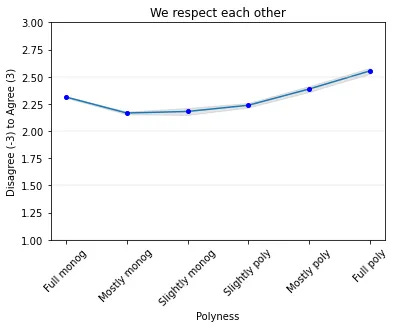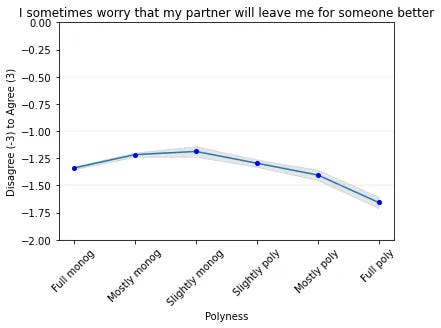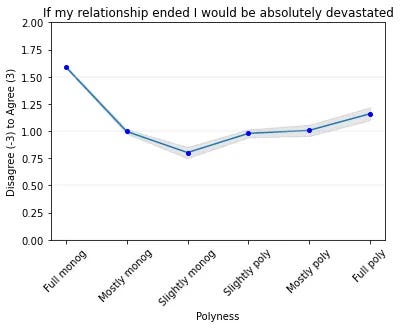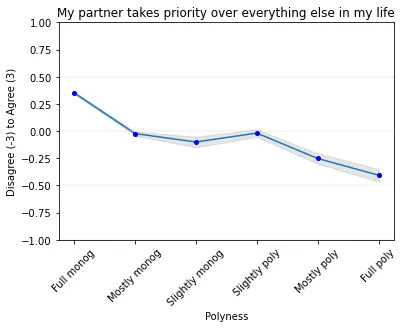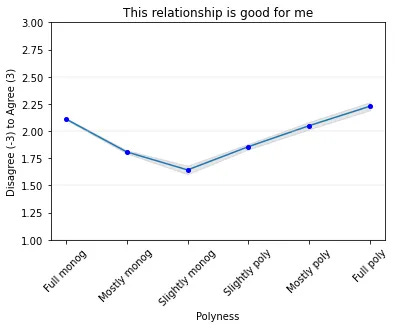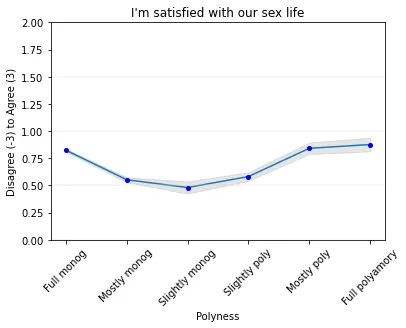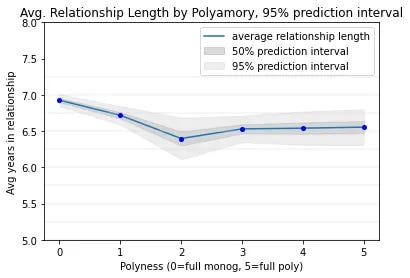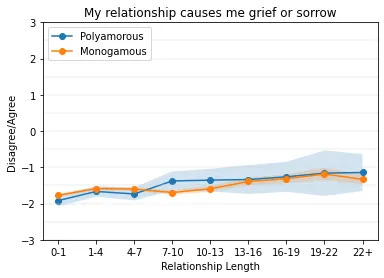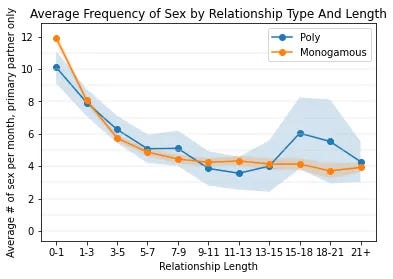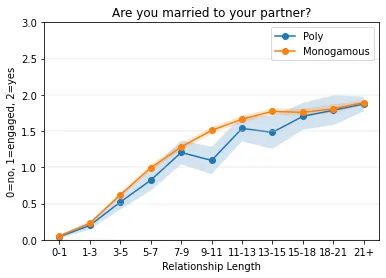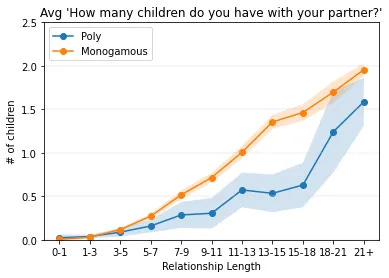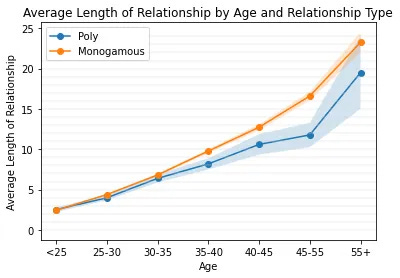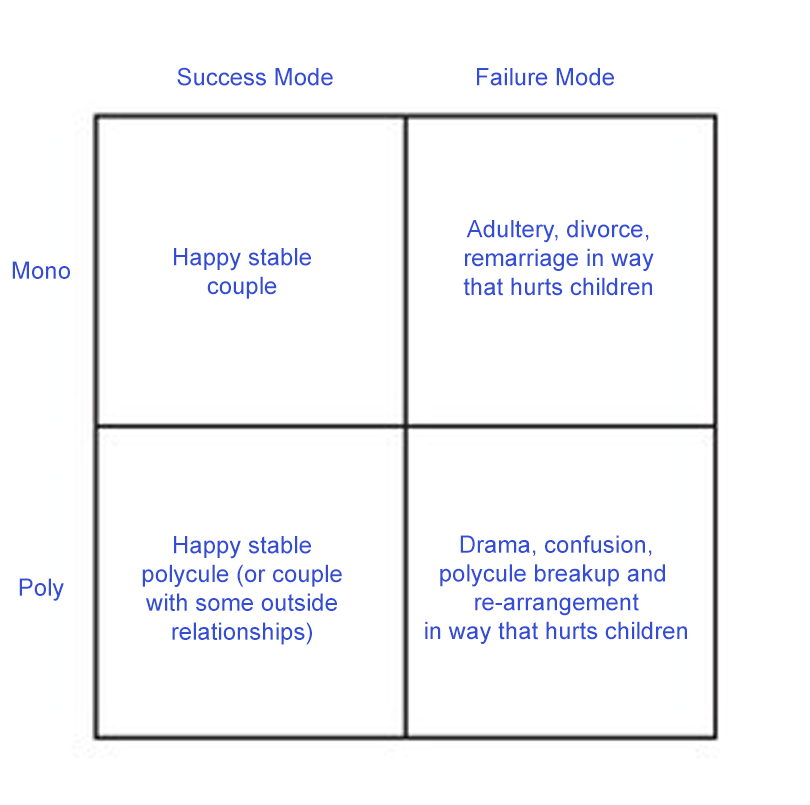Highlights From The Comments On Polyamory
[Original posts:Contra The Atlantic On Polyamory (subscriber only), You Don’t Hate Polyamory, You Hate People Who Write Books]
1: Comments I Can Respond To With Something Resembling Actual Statistics
2: Comments I Will Argue Against Despite Not Having Statistics, Sorry
3: Comments By People With Personal Anecdotes
4: Comments On Children
5: Other Comments
1: Comments I Can Respond To With Something Resembling Actual Statistics
Micah Zoluwrites:
I feel like a simpler rebuttal to such an article would be statistics comparing relationship happiness/satisfaction in polyamorous people and monogamous people. Does no such comparison exist which is why one must resort to reviewing n-of-1 studies or raising concerns about people deriving generalizations from a handful of n-of-1 studies?
I don’t know of any good published journal articles on this topic. I know of two informal surveys: Aella’s and mine.
Aella’s survey includes data from 430,000 people! The average social class is somewhere between lower-middle and middle, so this isn’t just capturing elites, and should be able to address concerns that polyamory only works as a “luxury belief”.
You can read a list of all her findings here. In all questions, monogamous people answer about their partner, and polyamorous people answer about their primary or longest-term partner. The ones that I found most interesting were these:
In general, polyamorous people were as happy with and committed to their relationship as monogamous people, and people “in the middle” were less happy than either. Aella thinks (and I agree) that this means that people who are genuinely committed to one relationship style or the other will do better than people who are “trying to open up the relationship” as a last-ditch move, or conflicted, or implementing a messy compromise between partners with different values.
Here are some other graphs that focus on relationship length:
The relationship length graph here at the bottom seems to slightly contradict the one above showing similar length; I think this is partly because there aren’t enough 45-55 year olds in the sample to make a difference in the aggregated data, and partly because I think the bottom graph combines “slightly poly” and “very poly” into a single “poly” category, and we already saw that slightly poly people do badly.
To a first approximation, poly people are equally happy with and committed to their partner as monogamous people, regardless of relationship length (though remember that this selects for relationships that are still going on), and they get married at about the same frequency.
However, they only have about half as many children.
This broadly matches the results of the 2017 SSC survey (I’m using 2017 because it had the most questions on sex and relationships). Mono and poly people had equal self-rated life satisfaction, but poly people had higher romantic satisfaction (6 vs. 6.6). Poly people were slightly less likely to currently be in a primary relationship that had lasted more than five years (34% vs. 39%), but this might be because they were slightly younger (31 vs. 33). Respondents were mostly young and childless, but poly people were only half as likely to have children as mono people (15% vs. 27%).
I think a fair summary of these results is “poly and mono relationships are about equally good, except that poly people have slightly higher romantic satisfaction and mono people are much more likely to have children; being wishy-washy in the middle is worse than either”.
I was poly for two years or so then stopped. Jealousy, in the sense of feeling bad because someone was sleeping with my partner, wasn’t a problem for me. I will say what the problems were, and I’ll be interested to see responses/links to responses.
I hung out in two polyamorous friendship groups: one was good but very small and not much happened. The other was large, and it was awful to be in for a man - to be blunt, because competition for females ended up happening two-faced way - “oh it’s so great to see you man!” - while not actually having any interest in one another. I don’t think the women were always aware of it (my primary partner certainly wasn’t). The problem polyamorous communities have that modal-person-is-monogamous communities does not is that men get an extra incentive to interact with other men: that incentive is a chance of sleeping with your partner. This makes for more shallow interactions.
To say a possibly-related and by-no-means-original thing: polyamory probably makes it so that more attractive men have extra sex, while less attractive men have relatively less extra sex. It seems plausible that this makes men, on average, more miserable (I appreciate this is related to jealousy of course, but not quite the same, because it’s not focussed on one person, i.e. one’s partner).
I could be wrong about that part - but if you think I am wrong, and that’s why you favour polyamory, please let this be a hill you would die on, that is, if I can show you that polyamory leads to misery of this kind, you have to give me that polyamory is therefore bad. I can understand people disliking the principle that some (attractive) people should have their personal lives limited in order to make life a little happier for less attractive ones, but sometimes that’s what it looks like to decrease misery.
With respect I also think Scott is not the perfect person to listen to about this, simply because is at the top of a status hierarchy and the people whose welfare I am concerned for are not there.
I’m not a person who thinks poly will be ruinous by the way - even without it there seem to be lots of reasons people are moving away from committed relationships with an eye toward having children. But I don’t think it’s good.
Sounds like a testable claim!
I decided to operationalize this as “on the SSC survey, polyamorous men would have a higher correlation between self-rated social status and self-rated romantic satisfaction than monogamous men”.
Among monogamous men (n=5268), the correlation was 0.323
Among polyamorous men (n=555), the correlation was 0.311
I’m eyeballing this as not a significant difference, and in either case it’s in favor of poly.
drosophilistwrites:
On average, straight men and straight women differ in their sexual/romantic preferences. For obvious evolutionary reasons, men’s sexuality is optimized for variety/novelty/as many partners as possible, while women’s sexuality is optimized for emotional attachment/find the best man you can and get him to stick around and help care for your babies. (Obvious disclaimer: I’m talking about trends and averages, not every man/not every woman, blah blah blah.)
For this reason, I’m worried that a widespread embrace of polyamory/open relationships would be a disaster for women. Sure, you’ll say that polyamory is all consensual and based on negotiated agreements, so what’s the problem? But it’s not so simple, and people who are emotionally entangled find it hard to make logical choices, and people are good at lying to themselves. “I can totally accept polyamory as the price of holding onto the man I love! [six months later] I’m so jealous and miserable and I keep hiding in the bathroom so he won’t see me crying, but all open-minded people do polyamory nowadays, I can’t let this get to me, I’m with the man I love, this is totally the right choice… excuse me while I get another box of tissues…”
If polyamory catches on in society at large, we’ll see, at minimum a lot of tearful letters to advice columns from women saying things like, “Dear Abby, my husband wants to open our marriage, I really hate the idea of him being with another woman but I don’t want to be an old-fashioned prude, plus I’m afraid he’ll leave me unless I agree, but the thought makes me so unhappy, what should I do?”
In the canonical poly survey, women were over-represented in polyamory; about 35% of poly people were men and 49% women (the remainder either didn’t answer or were nonbinary or something).
Commenters agreed with this, and said their experience was that polyamory was mostly female-driven. This is my story too; I became poly because the woman I wanted to date at the time was.
Why should this be, since men traditionally prefer sexual variety more than women do? I think one thing a lot of commenters are missing is that - despite people’s salacious dreams of what it must be like - polyamory usually focuses on the emotional aspect of relationships rather than the sexual. If someone wants to sleep with a bunch of people, they can just be a normal casual-sex-haver or swinger or something. Poly emphasizes the part where you have multiple relationships. This is more of a female fantasy than a male one, hence the female predominance.
There were a lot of you who were pretty sure that polyamory had to be bad in some way under some conditions. I challenge you to operationalize this in a way that we can test on future (or existing) surveys, eg “Poly people in the bottom quintile of status will report lower relationship satisfaction” or “Poly marriages among people without a college degree are more likely to end in divorce than monogamous ones.”
2: Comments I Will Argue Against Despite Not Having Statistics, Sorry
I had one of those childhoods that was so terrible that people find it fascinating but this seems just awful for kids. Again, I’m probably bias because my parents have racked up close to ten marriages between them and I grew up knowing that their first and most heartfelt loyalty was never to me. There would be my brothers and sisters, whichever of my parents we were with, and just some random person they’d decided they loved more than us. And that person definitely made their resentment of us known and usually made whichever of my parents was there perform some sort of loyalty test. Most other people I know in this situation have some kind of similar experience even if the examples are less dramatic and more open to being interpreted as over-sensitivity. Say what you will about monogamy but it makes lines of loyalty very clear within a family unit. That might not matter as much when there are resources to go around for everyone, but when you’re poor it matters a lot because there isn’t that much to go around and one year your step-mom might want to ritually humiliate you and your siblings by giving you socks at Christmas while her children open elaborate gifts.
Again, personal experience, blah blah blah. But you have to acknowledge that the pathways for this kind of thing open up just because you’ve expanded the numbers of players in the game and unaligned their motivations.
I take the opposite lesson that Some Guy does from this.
Quick digression: in medical studies, lots of people don’t take the experimental drug the way they’re supposed to. Maybe they get side effects and stop, or they screw up the dosing. There are two statistical ways of dealing with this, called “per-protocol” and “intention-to-treat”. In per-protocol analysis, only the people who took the drug correctly get counted. In intention-to-treat analysis, everyone who was assigned to the experimental group gets counted, even if they didn’t take the drug.
So, suppose that you have some drug which always cures a disease when you take it correctly, but it’s incredibly complicated to get right, and has lots of side effects and almost nobody ever makes it to the end of a course. In per-protocol, the drug looks great; in intention-to-treat, it looks useless.
Which is the better analysis strategy? It depends on what you’re using the number for. If you’re a patient, and you’re confident that you are smart and determined and can use it correctly, and you want to know your chances, use per-protocol. If you’re a social engineer, and you want to know how many cases of the disease you’ll cure by promoting the drug in the general population, use intention-to-treat.
I find this a useful lens to apply to social problems. For example, G.K. Chesterton famously said that “Christianity has not been tried and found wanting, it has been found difficult and left untried.” Supposing he’s right, maybe Christianity, when followed per-protocol, has a strong success rate in curing sin. But it looks much worse under intention-to-treat. If you assign people to the “Christianity” group - maybe by raising them in a Christian society where you tell everyone to be Christian, and where everyone goes to church on Sundays - then most people don’t follow the protocol, and they don’t become any less sinful.
Some Guy is talking about people assigned to the monogamy group. They were raised in a society that told them to be monogamous. They agreed to be monogamous. They probably had lovely weddings where they swore to be monogamous until death do them part. But it doesn’t sound like they were able to follow the protocol. Monogamy followed per protocol may have many good effects. But by intention-to-treat, monogamy looks pretty mediocre.
(nobody in this story was assigned to the polyamory group, and nothing in it speaks at all to the success or failure thereof)
Another way to think of this is as different failure modes:
The question isn’t whether the success mode of mono is worse than the failure mode of mono. It’s whether moving the marginal couple from mono to poly or vice versa makes success more vs. less likely.
I’m not sure what the answer is there. If you’re very optimistic, you could imagine that the people in the story above, instead of divorcing to be with another partner, could have stayed married, stayed with their children, and had another partner on the side. I’m not that optimistic. The people described don’t seem like they would be very good at any form of relationship. If you tell them to be monogamous, they will cheat. If you tell them they can have as many relationships as they want as long as they do so ethically and honestly, then they’ll do it unethically and dishonestly.
But occasionally, I do meet some people who I feel would be better served by polyamory. Here’s a conversation I sometimes imagine having with certain friends and/or patients (this is partly stitched together from a few real conversations with different people, and partly imaginary):
ME: So, you’re having a messy divorce.
THEM: Yeah.
ME: Because you cheated on your fourth husband.
THEM: Yeah.
ME: And now you’re dating a new guy. Are you worried that this might also end with you cheating on him?
THEM: No.
ME: Remember how we talked about the secret ancient rationalist technique of thinking about an answer for five seconds before you give it? I want you to try that now. Are you worried that this new relationship will end with you cheating on your partner?
THEM: . . . . . yes.
ME: Okay. Why do you think that is?
THEM: I guess I’m just a bad person!
ME: Can you be more specific?
THEM: I guess I’m just really impulsive, and sometimes I see someone and can’t hold myself back! I’m too flighty and horny to ever be happy staying with the same guy for too long.
ME: Okay. Can you think of ways that you could potentially address that in your next relationship?
THEM: No, I’ve already tried therapy, and I’m too extraverted to be happy never going to any places where I could meet new men. I don’t know what else to try! I guess I’ll just never be able to be in a relationship without destroying it.
ME: How would you feel about talking to this new guy you’re dating and telling him all this? Maybe he would be willing to agree to some kind of open relationship, so that if you felt something like this again, you could have a safe outlet that wouldn’t destroy the relationship.
THEM: No that would be unethical.
I’ve also met some people in the same situation as the “them” above who did switch to open relationships and it did seem to let them have a stable life / marriage / family in a way that they weren’t able to do before.
I don’t think this is right for everyone, but the people who need it, need it.
And here’s the kind of thing I see in relationship advice forums:
I used to hate when my wife went out to parties or conferences because I always worried she was meeting other men. I told her she couldn’t leave the house unless she texted me exactly where she was going and explained why it was necessary, and it made her mad, but she eventually agreed.
But she still talks on the phone to this one guy she’s been friends with since grade school. They’ve never had sex or anything, and he’s married to someone else, but they chat on the phone a couple of times a week and I always hear her laughing. I think it counts as an emotional affair and I told her that if she didn’t cut off all contact right away, I was going to end the marriage. Now she’s all mad at me. What should I do?
This just seems like a fundamentally unhealthy outlook on relationships and life. People with better emotional skills can figure out some middle ground where they still agree not to have “emotional affairs” or whatever but don’t freak out every time their partner has contact with another human, but seeing the version where this goes bad has kind of radicalized me. I think there’s something really attractive about being poly even if you never get around to having any other relationships, just so you don’t have to constantly be getting angry at your partner for having normal human desires.
TGGPwrites:
The real reason to prefer monogamy is that most cultures/societies have been polygynous, but the smaller number of monogamous ones were the winners in the contest of cultural group selection.
I’m nervous about cultural selection arguments because they seem to justify anything, and to rapidly switch what they justify. Three thousand years ago, a cultural selectionist could have said that most societies in the world were polygynous, so we should avoid monogamy. A hundred years ago, they could have said that most societies in the world were monarchies, so we should avoid democracy.
The problem is that nobody ever deploys cultural selection arguments against a failed trend that everyone hates. Nobody ever says “throughout history, most societies haven’t made people marry rocks, so we shouldn’t force people to marry rocks now”. Nobody wants to marry rocks now, so nobody needs to argue against it! Cultural selection arguments only get deployed against things that were once unpopular, but are in the process of becoming more popular - ie alleles that are currently being selected for!
This isn’t necessarily hypocritical. You could say that certain institutions are spreading for good reasons, and others are spreading for bad ones (and TGGP links my Competing Selectors post which makes exactly this point). But now you’re not really making a cultural selection argument, you’re making an “I did some armchair reasoning and decided this was bad” argument.
I think TGGP would answer that it doesn’t require any selective pressure to explain why people would want to have more romantic partners, since this is inherently fun for everyone. But first of all, no it isn’t - you can read the responses to this thread to see how viscerally unhappy some people are about this. And second of all, however fun it is now, it was probably equally fun a hundred years ago, so we still need an explanation for why it’s happening now and not earlier.
Another possible argument is that polyamory isn’t spreading by monogamous cultures dying out and being replaced by polyamorous ones. It’s spreading by word of mouth. But this is also how almost every cultural trend spreads. Monogamy didn’t spread to Scandinavia because the Vikings died out and the Romans colonized their land, it spread because missionaries converted them to Christianity. If some memoir converts somebody to polyamory, that seems like the closest modern-day equivalent.
I don’t really know how to rescue cultural selection arguments from these kinds of considerations.
Ascendwrites:
Okay, I have two basic objections to polyamory. The first is a broader but weaker point, and the second is narrower and stronger.
1. If you actually love someone, that person should be enough for you. Especially, if most people who claim to love someone do, in fact, find that that person is enough for them. I struggle to see how it doesn’t almost follow by definition that if Aaron wants to be in a monogamous relationship with Brenda, and Carl wants to be in a polyamorous relationship with Diana, then Carl loves Diana less than Aaron loves Brenda. Now maybe this assumption can be refuted somehow, by reference to irreducible personality types or something, but it certainly seems like the prima facie assumption, and requires an affirmative defence.
Splitting this up into two paragraphs so I can answer one at a time.
The traditional response is to ask: Do you think it’s bad for someone to have a second child? Surely if they really love their first child, one should be enough for them! More than one friend? In fact, why do they need to have a friend at all? Shouldn’t their partner be enough?
I think you can think of this in one of two ways. One is to imagine the original objection in the mouth of a Dickens villain: “We can’t invite other people to our Christmas party! They would consume our limited supply of Christmas cheer, and then there wouldn’t be enough left for us!” Obviously at the end of the Dickens book, the character discovers that cheer isn’t a limited resource, and multiplies rather than divides when shared with others. Some people genuinely think this way.
This isn’t really how things work for me. I want my wife to definitely be the most important person in my life and vice versa. But I find I can carve out a category “secondary partner” that doesn’t interfere with this, any more than her having friends , hobbies, children, etc interferes with this. Probably other people’s psychology doesn’t work this way, and those people wouldn’t enjoy being poly.
2. There seem to be two types of polyamory: the “hippie” kind where a group of people are all in a single demarcated “relationship” with each other, all know each other as either friends or lovers, and having sex with anyone outside that group would be condemned as cheating. And the “open relationship” kind where two people are dating or married but are “free” to sleep with other people (but still have each other as a “primary partner” or some such). The first, while I’m not endorsing it, seems to have decent case for being a form of actual love. The second, unless I’m missing something, looks like despicable pure hedonism. First, because the “primary” aspect shows it really is all about sex, not about sharing your love with someone else. Second, because it’s basically legitimised cheating, and for all the talk of mutality what’s to stop someone pressuring their spouse to “consent” to “opening” their relationship? (I’ve seen a number of online stories of this happening, though with beautiful poetic justice where the pressured partner ends up finding someone who actually values him or her and wants a true relationship, and the other partner ending up entirely alone and certainly not finding the harem they were expecting). And third, because it creates competition between the two spouses over who can get more partners, and for fuck’s sake a marriage is the ONE place such toxic sexual competition should not exist!
Re: 2 - As I mentioned above, polyamory seems more about the romance angle than the sex angle.
One interesting demonstration of this is how many asexual people are poly. In the 2017 SSC survey (the same one cited above), about 5% of polyamorous people described themselves as asexual (having no sex drive) compared to about 3% of monogamous people. These people are probably in relationships for the emotional benefits.
I also checked sex drive among people who were in monogamous relationships, stable polycules, and open relationships (this is the 2019 SSC survey, which went into more depth on sex and romance). There were no significant differences in sex drive among these three categories.
Invectives about polyamory are inevitable now, in the current phase of polyamory Overton window shift. This is the only acceptable way polyamory can be currently portrayed and discussed.
As Overton windows move for new social norms like LGBT and polyamory, the mainstream media narratives evolve along the axis of omission/taboo -> negative/critique -> ambiguity -> struggle/oppression ->positive -> new normal. We have seen LBGT cover almost all these steps during recent 40 years, currently I think we are between positive and new normal. With polyamory, we have just recently moved from omission/taboo to negative/critique. Portraying polyamory as positive or struggling/oppressed in mainstream media is still out of the Overton window, showing ambiguity is now at the edge, only negative critique is in the window. This is also why almost all movies and shows about polyamory are telling a story of a failure of a polyamorous relationship.
Positive polyamory testimonials exist on social media, but usually the comments below are a shitstorm. This also proves how positive portrayal is unacceptable. At the same time, positive polyamory testimonial + shitstorm comments = negative meta-content bundle that itself fits well within the Overton window.
Note that these negative portrayals still promote polyamory somehow, as they at least put it on the map. 10 years ago there were no polyamory movies, shows or social media content - it would have been unthinkable, as we were in the omission/taboo phase back then.
Yeah, one pattern I see pretty often goes something like:
-
Weird people, who maybe weren’t able to cope with normal institutions, find some weird new thing that works for them, okay, cool, whatever.
-
Journalists pick up on it, and write articles on how it’s new and quirky and unique, and how the people who do it are realer and more self-actualized and more human than the boring people who don’t.
-
A bunch of people who don’t enjoy the thing and aren’t good at it do it because it’s trendy, and they are terrified of becoming obsolete as human beings unless they follow all the latest trends.
-
A bunch of people who reflexively hate journalists pooh-poohing them for not being deviant enough loudly announce that they hate the new thing (which unfortunately plays into the journos’ hands - it’s bad on purpose to make you click)
-
Constant battles between the trendy people and the performative haters.
My position is that I feel sympathy for everyone involved except the journalists.
[Polyamory is] particularly harsh because the culture pathologizes ordinary human responses (anxiety, jealousy, loneliness) as if they’re deviant. This seems to drive underground the kind of useful conflict - in which issues get addressed and incremental improvements made - that are standard operating procedure for high functioning monogamous relationships. I’m sure some people can do polyamory well, but it’s not for many, and certainly not for most.
Nobody can indulge the entire human experience, unless they’re very lucky and have no contradictory desires. If you’re monogamous, you have to fight the natural human urge to desire people other than your partner (some people won’t have this urge, but many do). If you’re polyamorous, you have to fight the natural human urge to feel jealous (some people won’t have this urge, but many do). I think a good monogamous community won’t pathologize desire, but will politely and firmly remind you not to surrender to it, and a good polyamorous community will do the same with jealousy. Some people will do better with one set of restraints, and other people with the other.
(It’s actually worse than that, because even monogamous people can’t be so jealous that they get paranoid and restrict their partner’s normal activities, and even poly people can’t have relationships that are incompatible with other relationships they want to keep. Everyone has to restrain their desires at least a little all the time, and wisdom consists of knowing which ones to follow, which ones to restrain, and not freaking out about it).
3: Comments By People With Personal Anecdotes
Yunshookwrites:
I’m about to jump on a 12 hour shift running conduit, so I apologize if this is a little disorganized. Id intended to write this for next Monday, but it’s topical.
I’ve been thinking about the structures I’ve observed in polyamorous groups and the challenges that they face. Very little is codified as generally acceptable in the space, though certain pods may have structural rules that work for them. As a whole though, it’s a kind of laissez faire dedicated to maximizing sexual access rather than building cohesive groups of reliable people with healthy relational habits. I suspect this focus on sexual access alone is an accident of how political sexual liberation has affected polyamorous culture rather than an inherent evil that is baked into the practice.
In many, (though not all) polyamorous groups I’ve seen, kids are often an afterthought who are brought up by single mom’s who often find themselves as satellites to several disparate polyamorous groups. The nature of easily picking up a new flame and dropping old ones makes it easy to pick up attractive but difficult people, and get rid of them (and their kids) when they become too inconvenient or unreasonable. Given the inherent complexity of maintaining multiple relationships, I see it a lot. 2 people have 1 relationship to manage, 3 have 3, 4 have 6, 5 have 10… And so on. So many simplify to a wheel and spoke type of relationship structure to simplify. There may be a primary power couple who are tied together financially and they sleep with other people who are easily discarded and have no financial obligations to them. Children produced in this manner are similarly easy to discard, and grow up in difficult circumstances. Some pods have around 4 or 5 people who are part of the primary group and financial obligations are slightly more rigid, though I have often seen an ease of discarding in this structure as well. In these groups I’ve seen that the kids sometimes stay with the main pod while the satellite parent is ejected. This is marginally better, but still not ideal.
Raising healthy children who have stable family backgrounds could be a primary focus within polyamorous culture in the US if expectations were a little more codified and there were fewer individuals flying the polyamorous flag for hedonic sexual pursuits alone. Kids need a fair amount of support, stability, and need to have connections to people of all ages to grow up as responsible, strong minded people. The small village mentality that could exist in polyamorous groups could reduce the burdens most parents experience in child rearing, because there can be a number of kids growing up together with a number of parents to provide support. But again the lack of codified expectations in that space means that relational churn is prevalent.
I’d be interested to see what effective polyamorous marriage would look like as a legal institution, as it could provide satellites who have kids more recourse. However, it still wouldn’t solve the cultural issue of commitment to relationships, which is increasingly rare in monogamous couples as well. How to address that and make people just behave as good people in relationships can’t really be written into law. I suspect there may be something about the templates of life we learn from the dominant stories we consume, but that’s a whole other tangent.
I think the major point here is that it isn’t polyamory so much as the dominant strain of polyamory that is so distasteful. Since it looks like it’s around to stay, I’d like to see it hashed out to be healthier and geared towards making good people.
Also Yunshook:
I’ve seen a lot of adoption of polyamory among disabled and those on food stamps where I live. It looks to be a strategy to find resources as a group, as well as to maximize sexual access for those who are not traditionally desirable. As an outsider, I have observed a lot of toxic behaviors in these groups, but it seems to be far more common than one would expect. I’d love to see the numbers, but my intuition says that this amount of buy in doesn’t go away quickly. It’s possible that there aren’t many people who are actually interested in healthy polyamory outside of a few well off, responsible individuals such as Scott. Possibly most people just want casual sex on the side of their committed relationships. If that is the case, I’d prefer a culture of swingers in already committed relationships to a culture of satellite relations who have no recourse. At least swinger couples and quads each have two parents who are financially responsible for any kids that come around because of one of their dalliances.
Matt Arnoldwrites:
Reducing one’s romantic relationships to political statements is a real thing. I spent time for a few years in a polyamory group which turned into a Relationship Anarchy group. They redefined “Polyamory” to mean every bad thing that anyone labeling themselves polyamorous had ever done to them. Some of them eventually did that to the term “Relationship Anarchist” too, and switched to “Political Relater”. I wrote more about this here:
https://nemorathwald.dreamwidth.org/400711.html
In retrospect, I might say to my past self “you don’t dislike Political Relaters, you dislike those who attend meetups about things.”
As you can probably predict, that link is a doozy.
I think the general form of “you don’t have polyamory, you hate people who write books” is “you hate the kind of people the link describes”. I promise that there are other polyamorous people who are normalish people with normalish politics who have normalish relationships that just happen to be with more than one person at a time.
Concerned Citizen (blog) writes:
All of the happy polycules I have encountered have a lot of trans or autistic people. Just going by personal observation I don’t think it works so well with neurotypicals, if you can call solomonesque narcissism neurotypical.
The happiest polycules I know are asexual people. The second happiest are people who have sex so frequently and compulsively that it’s impossible for them to be angry with their partner for sleeping around because not-sleeping-around seems as impossible to them as falling upward. Autistic is third (and sometimes overlaps with the previous two categories). Trans people in polycules tend to go either very well or very very badly, no in-between.
Radarwrites:
The books I’ve seen on polyamory are self-help books not memoirs and in that they seem to be sincere attempts at helping people think through what kinds of resources and capacities a person might need to have on board to pull it off successfully. Those books make it seem like a second full-time job to pull it off responsibly, and not a lot of people have that kind of time or capacity. For the people that do, or who pull it off well regardless, there’s nothing to hate it seems to me.
I do wonder if there are two kinds of people doing polyamory (just to oversimplify for a minute) – those who are doing it to try and solve problems in their monogamous relationships and those who are proactively setting out to create polyamory from the start because that’s what they want.
As a therapist (and from talking to colleagues) many of our client bases tend to select I think for the first kind, and that does give us a biased view because in that context, polyamory looks like people putting a lot of energy into new and exciting romantic and sexual liaisons while they’re having trouble communicating and being emotionally present for their primary relationship. And for a while that may bring a kind of breath of fresh air back into the primary relationship, but it also brings a ton more emotional and psychological complexity which the primary relationship is not equipped to manage. I’ve seen multiple situations, with and without kids, where polyamory was a transitional step to divorce (and of course that’s not an indictment of polyamory itself).
Therapists also see situations where even if the parents manage polyamory well between them, it’s very time and energy intensive at a time developmentally when their small kids need a lot of care. Young kids can have a hard time getting enough care anyway with two working parents in late-stage American capitalism with all its demands outside of the family. So seeing the parents’ spare going to nurturing second and third romantic interests when the emotional needs of the kids (or the grownups for each other or themselves individually) are not adequately met seems like not a helpful thing.
Now of course polyamory in that frame can join all the other things that people choose or have to put energy into – substance use, very involved hobbies, workaholism, economic precarity, media consumption, emotional avoidance, etc.
On the other side, the nuclear family in our current culture is pretty widely insufficient for parents and children. As well that narcissistic self-gratification is not an adequate motivation to sustain a marriage. So to the extent that polyamory might offer more social connectivity for people and to the extent people in it create a larger sense of purpose for it than just self-gratification, then maybe it’s a good alternative social structure, including maybe for raising kids.
My bias is that many of my data points make it look like people engaging in emotional avoidance by finding another arena in which they can pursue self-gratification. I’d be interested to hear from people happily in polyamorous situations and who have more data points any reflections about whether they see these two kinds of people doing polyamory and any guesses about what the ratios are (and really anything else they might want to say).
CJWwrites:
There seem to be a couple distinct strands of polyamory I’ve noticed, one has a massive PR problem and the other doesn’t want PR at all.
On one hand you have these arrangements that sound like some nightmarish bubbling ooze emerging through several sedimentary layers of Tumblr and Asperger’s. “Queer catgirl polycule” kind of stuff that you’ll see late-transitioning transwomen post about when they’ve basically abandoned any idea that they can find a home in normieville. Living arrangements that get broadcast as shock journalism in the Daily Mail, seemingly tailor made for normies to look down on the whole thing. A continuation of the Jerry Springer spectacle, often completely fabricated by the participants, but a spectacle that nevertheless convinced me at a very young age that involving any 3rd person in a relationship would probably just get a chair thrown at your head.
On the other hand, there are various flavors of “swingers”, with a surprising amount coming from the ex-military and current law enforcement community, who have semi-stable ongoing activities with another couple. They don’t want normies knowing about any of it, and treat it like a secret club. So the publicly successful and well-adjusted members of the community who have secret sexual/romantic lives aren’t talking about them, and as a result that leaves only the eccentric outsiders as the “face” of the lifestyle, such as it is.
I have never had an inclination towards any of this, the amount of potential drama just seems miserably high, and I’ve been conditioned to see it as either low-status or psychologically damaging to a person’s self-conception of their social identity (“if you go too far, you’ll never get back to where the rest of them are”.) I think that a society which encourages people to view polyamory negatively is probably doing most people a favor, as most people will find these arrangements dangerous and unrewarding and are better off being steered towards traditional monogamy. If you decide you really want to do it later in life, you’ll find the pineapple people or an adjacent alt-lifestyle group eventually, and you know where California is if you want to go further than that. I don’t hate polyamorous people, but I do find them weird, and it’s probably for the best if most people feel the same.
Justinwrites:
As someone who has never read a book on polyamory but knows several people who have been or are in those relationships, they are near universally unhappy or one partner is dissatisfied with the relationship. In all these cases, the major friction in these relationships is coming from the structure of the relationship.
I know it is not for me, but I see a lot of my friends who are trying to “have it all” so to speak and very reluctant to confront the problems coming from their arrangements.
Jaybirdwrites:
In my (limited) experience, there are two kinds of polyamorous people:
1) Polyamorous 20-somethings. These guys are insufferable. They jump back and forth between “You shouldn’t be so judgmental” and “Polyamory is the only ethical way to hold relationships”. “You shouldn’t snark at people who are different than you” and “The human heart is large enough to hold more than one person!” “LET ME TELL YOU ABOUT THE JOYS OF NRE!!!” Toxic people yell “I’m polyamorous!” and, suddenly, the topic shifts away from the toxicity to defenses of Polyamory Theory. Ryan cheats on Chris and the community joins together to tell Chris to be more open-minded and less selfish.
2) Polyamorous 40-somethings. These guys are pretty okay. There’s a lot less jumping back and forth. It’s not really a “polycule” as much as a “stable triad/quadrad”. NRE? Ha! I’d have to leave the hosue. Oh, man. I haven’t thought about Ryan for years. I heard they moved to Wisconsin. I think Jamie is still Facebook acquaintances… I’ll ask next time we get coffee. You know what? I won’t. I don’t care. I’m glad they’re no longer here.
The problem is that the only way to get a 40-something polyamorist is to take a 20-something polyamorist and wait a couple of decades.
I’m fascinated by how many people think there are two types of poly people, but disagree on what those types are.
Moon Mothwrites:
The distribution of personality types in “poly” has changed over the years. Like with tech, in the beginning there were a bunch of early adopters, figuring out how to implement feminist theory in a way that let them have lots of sex, and they tended to be fairly good about self-awareness and boundaries and the like. I expect that Scott’s circle is a younger generation of people like this. But there were also people who discovered the poly community and thought “if I say the right words, I get to have fun, and if I say these other words, I can hurt people and get them to think it’s their own fault”. And eventually there were people who thought “if I say the words other people say, and do the things other people do, I can fit in with the cool kids”. (Similar to what happened with wokism.)
…or maybe they’re the same two types, just described in different ways? I don’t know.
N Wwrites:
I’m a tall, good looking guy. I was cool and in popular groups. I’m the chad. The cool and good looking guys slept around. The less good looking guys tried but did poorly. The top dogs were shamed by many of the top girls for being ‘players’, but they would still get involved with us.
Poly came around and you could tell people about it and most would think it was cool, but few would challenge the idea because… well we were cool and they weren’t. You can convince uncool people of many things by being cool and good looking.
Cool people never said they were poly back in the day. But we definitely acted poly. Then some more nerdy guys started to say they were poly. This let more moderately attractive people have greater sex choices, something only good looking guys previously had.
I’ve had multiple girls. Many times. It’s not hard to do but it’s a headache. I got older and decided on one girl. If you want kids, one long-term partner focused on your children is better (time is resource constrained).
For all the poly people out there, Chads are so much better socially. We get more practice — the amount of gentle touch to maneuver numerous relationships is large. We’re better than you at it. Are we better because of skill or because people are nicer to us? It’s probably a bit of both. Most poly people seem pretty bad juggling things and ruin their lives. You get more slack when you’re high status or hot. If you aren’t high status or hot you’ll struggle.
Even with all those skills and numerous opportunities most of the Chad guys I know (85-90%) pick one girl eventually, because it’s tedious! You will become more bored of sex (not entirely but a lot) and you’ll want other things than sex optionality as you age.
Hot guys have sex optionality in monogamous relationships. We can cheat faster than you stumble getting her number. But we overwhelming don’t. It’s a tremendous waste of time. This ‘support relationship’ or whatever nonsexual relationship you might also think about having is a waste of time.
I don’t know how else to write this. I feel like my writing skills are sorely lacking compared to the more bookish people on this website. As a man who’s lived the poly life poly people romance. It’s not worth it. It’s rationalized horniness.
IF you plan to never have children, poly is fantastic. The Chads I know that didn’t pick one girl are either dead or taking drugs and will likely remain bachelors
I think this backs up my claim that poly is mostly not people trying to have lots of sex, it’s people trying to have lots of relationships.
4: Comments On Children
Some Guywrites:
I would just refer back to the statistics on the likelihood of abuse when an adult other than a parent is in the home. Why would those be different in a polyamorous situation? That’s my general system level proof of which one of these is likely better for children at the social level of analysis. Also the statistics about the general well-being of children with two parents in the home. That is very clearly more stable, you probably know those statistics better than I do, and while of course not perfect it does seem very hard to argue that if that wasn’t the case for more people (which we know is possible because it was the case for virtually everyone not that long ago) general welfare would be much better.
Slight nitpick that in most poly families all partners would consider themselves parents. But stepparents also consider themselves parents, and the statistics Some Guy cites show bad outcomes for stepparents, so I don’t think this is a good counterargument. I tried to respond here, but overall I agree that this is an important point.
Anomiewrites:
Human children are probably the most demanding children to care for on Earth. Traditionally, mothers had a lot of help from their extended family and friends in raising their children, but that’s not really possible under the current status quo of monogamous nuclear families. If we could just normalize setups that made this kind of collaborative childcare practical, maybe that could encourage people to have more children. …Of course, there’s still the issue of affordability, and we still have a problem of people failing to form relationships in the first place. sigh I really doubt things are ever going to improve at this point.
Brendanwrites:
You could imagine further scenarios where the two original parents stay together in a loving relationship prioritizing the children, the only difference being that the parents don’t restrict eachother from having additional romantic/sexual involvement with other people. This could have positive or negative effects on the children, but those effects would be a result of the way the parents behave and prioritize, regardless of whether they place default restrictions on eachothers romantic/sexual interests.
A parent prioritizing a (additional) romantic relationship over their children is no more harmful than a parent prioritizing their friends over their children. The issue is the way they’re prioritizing. When I defend polyamory I’m not defending loosening your familial bonds.
5: Other Comments
Person Humanslywrites:
I think the reason most people are uncomfortable with polyamory is that it subverts the dearly-held mythology of all-conquering “true love” between soulmates that pervaded western culture for a few centuries until the last decade or-so. Years ago, Jason Pargin (of Cracked.com, back when it was still relevant) said that outsiders looking back at our culture would see romantic love as our religion, and I think he was right.
I think most poly people would disagree with this perspective. I think they would say you can love truly, it’s just possible to do with many people at once. Or even if you only have one true love, you can at least have a couple of other enjoyable and beneficial relationships on the side.
This is also what made me angry about the recent Sam Kriss piece, where he just assumed as a matter of course that you could use “polyamorous” synonymously with “people who don’t really love each other”.
I used to be confused by the idea of “stereotypes are bad”. Like, we’re supposed to be angry when someone says “women are bad at math”. But if this means “on average, women are worse at math than men”, it’s true, and if it means “no woman has ever been good at math”, this is an insane statement that I’m not sure anyone has ever believed. So what’s the stereotype which is both bad and a real thing people say?
The answer is: it’s when people are too casual with their beliefs to even think in these terms. I think Sam Kriss, if we asked him whether poly people are less likely to be in love than mono people, wouldn’t be entirely sure. If we asked him whether they’re incapable of love, he would agree that’s insane. He just wrote an article that kind of vaguely assumed this was true as background information.
For the first decades of my life, we were so immersed in it that it didn’t occur to us that it was strange compared to other times and cultures to believe in and focus on finding your “true love,” mutually “falling in love” with a soulmate for an eternally-passionate, all-satisfying, exclusive marriage that transcends and conquers all problems. Most of our popular stories reinforced these myths, from Disney’s “Happily Ever After” twists on ancient fairy tales that originally had dark endings, to hero’s journey stories that required the crucial step of “getting the girl,” to more-disturbing stories like Punch Drunk Love. It was so pervasive that it was shoehorned into the ending of Fight Club, where we barely even noticed that it didn’t make much sense.
As these myths have been breaking down in recent years, movies and TV shows have started moving away from them, but to the many people who still hold these romantic myths as dearly as a religion, hearing about people who don’t share them can be as frustrating as hearing about the “new atheists” was to fundamentalist Christians in the early aughts.
I realize that maybe this commenter was trying to say that deflating love was a good thing, because our culture over-rates it. I’m not sure. I used to have a position something like “love is less important than having the basic stability/responsibility to raise children together”. Now that I have children, I’m starting to think that it’s pretty rare to have so much stability and responsibility that you can stay with someone through all of the stress and craziness of child-rearing using virtue and willpower alone. You also have to love them enough that it’s fun or at least tolerable to be constantly stressed out as long as it’s together with them.
This is part of why I dislike the word “coparent” which is catching on now for the same reasons as “partner”. Yeah, as relationships get more complex it’s sometimes useful to have terms which don’t necessarily imply other terms. But I think it undersells the difficulty of trying to coparent together without something that at least sort of resembles love.
(obviously having kids with someone you love who isn’t responsible and stable won’t work either. It’s maybe unfair that you need both love and responsibility, and maybe I’m doing something wrong since billions of people have had kids since the beginning of time and surely they didn’t all have both these things. But I’m not sure that I could do it without both.)
Eremolaloswrites:
Inviting anyone who would find it entertaining to join me in coming up with the most irritatingly narcissistic book titles they can think of. Such as:
The Adorable Complexity of Being Me
Woke Polyamorous Ayahuasca Meditation – a Spiritual Path for the Intrepidly Sensitive
Anonymous Dudeadds:
Becoming Fully Myself
Revolution from Within: A Book of Self-Esteem
Me/Myself/I: A Journey of Three and One
Every Man and Woman is a Star
_Transgressing Boundaries: A Non-Binary, Non-Toxic, Non-Violent Journey
Neutralizing Poison: The Fourth Level of Self-Healing (the first three being, of course, Curing Light Wounds, Slowing the Venom, and Banishing Blindness, and the sequel being Returning from the Underworld)
The Love of an Influencer: Very Different from Conventional Love_
Hey now, “Every Man And Women Is A Star” is from The Book of the Law, which whatever else you want to say about it definitely isn’t boring hippie therapeutic self-help. But otherwise these are great/awful.
Matthew Carlin recommends us this Terrible Self-Help Title Generator. And Moon Moth points out that there is a book called A Woman First: First Woman: A Memoir, but I’m not sure I can give it full credit: it seems to be a fictional memoir by a popular TV character and might be deliberately bad.
TGGPwrites:
Polygamous marriage is still not legal in the . . . cultures which appear capable of maintaining above-replacement fertility . . . like the Amish & ultra-orthodox Jews.
Funny story! Polygamy was legal in Judaism during Biblical times (eg King Solomon and his seven hundred wives). The Talmud is vague about the practice, but mostly seems to treat it as undesirable but not forbidden. It only became fully illegal in Judaism around 1000 AD, when Rabbi Gershom ben Judah banned it for all Jews under his authority (approximately all European Jews, but non-European Jews gradually adopted his position too). Rabbi Gershom said his ban would expire at the end of “the thousand”, which has been interpreted variously as the end of the Jewish millennium (1240 AD) or the end of a thousand years (2000 AD).
In either case, the ban is now expired, and the prohibition on polygamy rests on questionable legal footing. Most mainstream rabbis continue to ban it based on “custom”, which can have legal force under Jewish law in certain situations. There’s probably some extremely convoluted set of positions you could take on the law where polygamy would be legal - especially if a Jew isn’t of European descent, or lives outside of Europe.
You can read more about this at What’s The Truth About The Expiration Date Of Rabbeinu Gershom’s Ban On Polygamy?
6: Updates
I didn’t know before looking into the statistics for this post that poly people were that much less likely to have children. I find that disappointing. Probably some of this is self-selection by people who wouldn’t have had children anyway, but it’s still unfortunate.
I was surprised how certain people were that poly relationships were disasters that couldn’t work, compared to how little of a sign there was of that in the data. I like Aella’s explanation that most mono people’s experience of poly people is mono people “experimenting” with “opening up their relationship”, which is a natural danger zone. An alternative is that Aella got a bad sample (but her sample ought to be much more representative than mine), or that poly people lie / misremember / have a hard time answering surveys.
I found Some Guy’s concern about the abuse risk of having an extra person in the house to be thought-provoking and something I hadn’t considered before. I think it won’t apply very often (because poly people have fewer children, and even when they do there’s rarely a third partner in the house). In the cases where it does apply, I’m conflicted. I think of the cases I know, and I’m as close to 100% certain as anyone can be that the third partner isn’t an abuser. But obviously people date abusers all the time thinking that they’re not abusers, and “check if someone is an abuser before inviting them in the house” isn’t a primitive action that people can always get right. I think more about this here.
